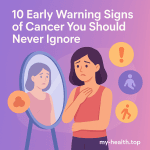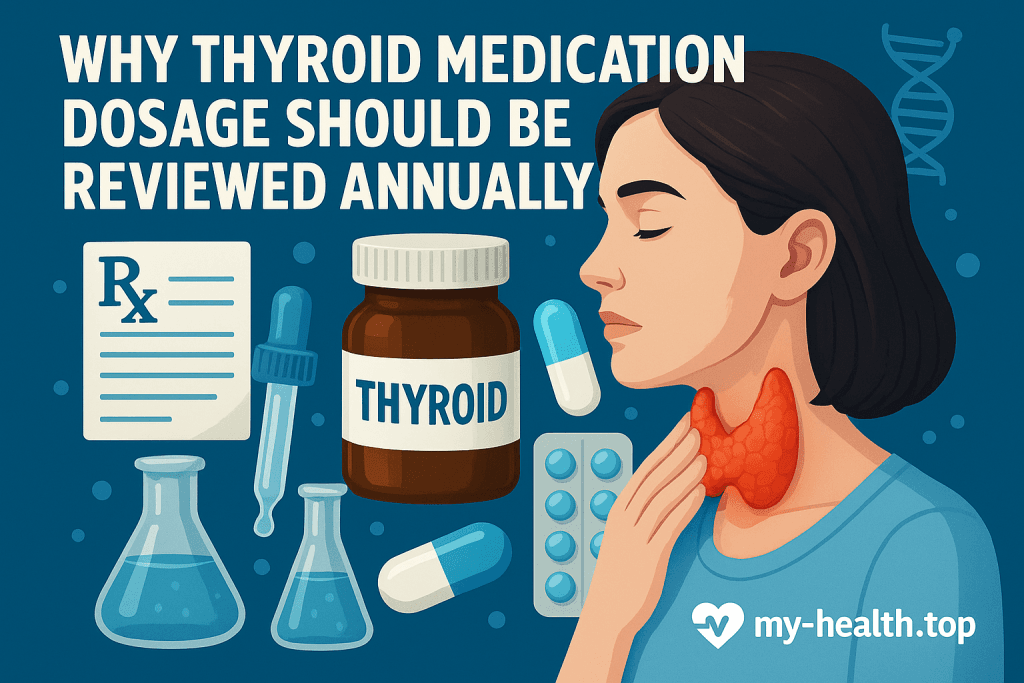Introduction
Millions of people take thyroid hormone supplements like levothyroxine to treat hypothyroidism (underactive thyroid). However, new research has raised important concerns: taking too much of this medication may increase the risk of dementia, especially in older adults.
This discovery reinforces the importance of annual thyroid hormone monitoring to ensure the dosage remains appropriate with age. Let’s explore why reevaluating your thyroid medication regularly could be crucial for both brain and heart health.
Understanding the Role of Thyroid Hormones
The thyroid gland, located at the base of the neck, produces hormones that regulate key bodily functions, including:
- Metabolism and weight management
- Body temperature
- Muscle strength
- Mood and cognitive function
When thyroid hormone levels are too low, it can slow down the body’s systems—causing fatigue, weight gain, and depression. That’s why many people are prescribed levothyroxine, a synthetic thyroid hormone.
But there’s a catch: too much thyroid hormone can be just as harmful as too little.
TSH Levels: The Key to Dosage Monitoring
The pituitary gland in the brain produces thyroid-stimulating hormone (TSH) to regulate thyroid function. Doctors typically use TSH levels in blood tests to indirectly measure thyroid hormone levels.
- High TSH = low thyroid hormone (may need medication)
- Low TSH = high thyroid hormone (may indicate overdose)
Adjusting your medication based on your TSH level is essential. Regular testing ensures the balance is maintained—and prevents long-term risks.
The New Study: What It Revealed
Researchers analyzed data from over 65,000 patients aged 65 and older between 2014 and 2022. None had cognitive impairment or low TSH levels at the start.
During the study:
- Some participants developed very low TSH levels due to high doses of levothyroxine.
- 7.2% of these individuals (4,779 patients) developed new cognitive impairments, including signs of dementia.
This raises a red flag: even if thyroid medication is prescribed correctly at first, dosage needs can change with age. Over time, the same dose could become excessive.
Who’s Most at Risk?
The study highlighted several at-risk groups:
- Older adults, especially those who’ve been on a set dose for years
- Women, who were more likely to be on excessive doses
- Individuals with unmonitored or outdated prescriptions
Taking too much thyroid hormone isn’t just a cognitive risk—it also increases the chances of:
- Atrial fibrillation (AFib), a dangerous irregular heartbeat
- Osteoporosis and bone fractures, especially in elderly women
Expert Recommendations: Review and Reassess
Dr. Jennifer Mamen, the study’s lead author, recommends that TSH levels be checked at least once a year, particularly in older adults. She notes that:
“Many people in their 40s or 50s—or even earlier—are on a specific dose, but with age, that dose can often be lowered.”
This regular review allows physicians to adjust or even discontinue thyroid medication if necessary, reducing long-term risks without compromising thyroid health.
A Widespread Concern
In 2020 alone, 24 million prescriptions for levothyroxine were issued in the U.S., making it one of the top three most prescribed medications.
Endocrinologists from the University of Michigan and the Mayo Clinic, in a companion editorial, raised concerns that the medication is:
- Overprescribed, especially in elderly patients
- Sometimes given without strong clinical justification
They urge more cautious prescribing practices, especially when TSH levels are only slightly low, which may not require treatment.
What Should Patients Do?
If you’re currently taking levothyroxine, here’s what you can do to stay safe:
- Schedule annual TSH tests to monitor your thyroid levels
- Ask your doctor whether your dosage is still appropriate
- Report any new symptoms, especially related to memory, mood, or heartbeat
- Do not stop or change your medication without medical advice
Managing thyroid conditions doesn’t have to mean taking the same dose forever. Your body—and its needs—change with age.
Conclusion
Thyroid medication has improved the lives of millions, but more is not always better. Excessive levothyroxine can pose serious risks, particularly for aging adults.
Regular check-ups, blood tests, and open communication with your doctor are vital in ensuring you receive the right dose at the right time. Protect your brain, your heart, and your long-term well-being—review your thyroid medication annually.
- Adams RJ, Oh ES, Sevil Yaşar, Lyketsos CG, Mammen JS. Endogenous and exogenous thyrotoxicosis and risk of incident cognitive disorders in older adults. JAMA Intern Med. Published online October 23, 2023. doi:10.1001/jamainternmed.2023.5619
- Wieland DR, Wieland JR, Wang H, et al. Thyroid disorders and dementia risk. Neurology. 2022;99(7):e679-e687. doi:10.1212/wnl.0000000000200740
- MedlinePlus. Levothyroxine.
- American Thyroid Association. TSH reference ranges should be used to safely guide thyroid hormone treatment in hypothyroid patients.
- Papaleontiou M, Brito JP. Disentangling the association between excess thyroid hormone and cognition in older adults. JAMA Intern Med. Published online October 23, 2023. doi:10.1001/jamainternmed.2023.5618/








Post a comment